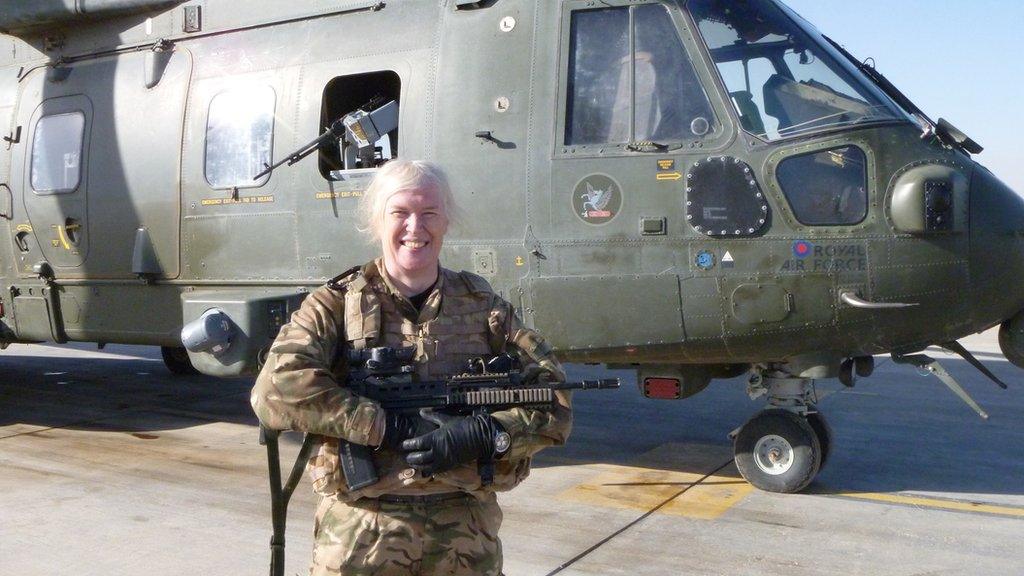LGBT veterans call for prime minister apology for their treatment
- Published
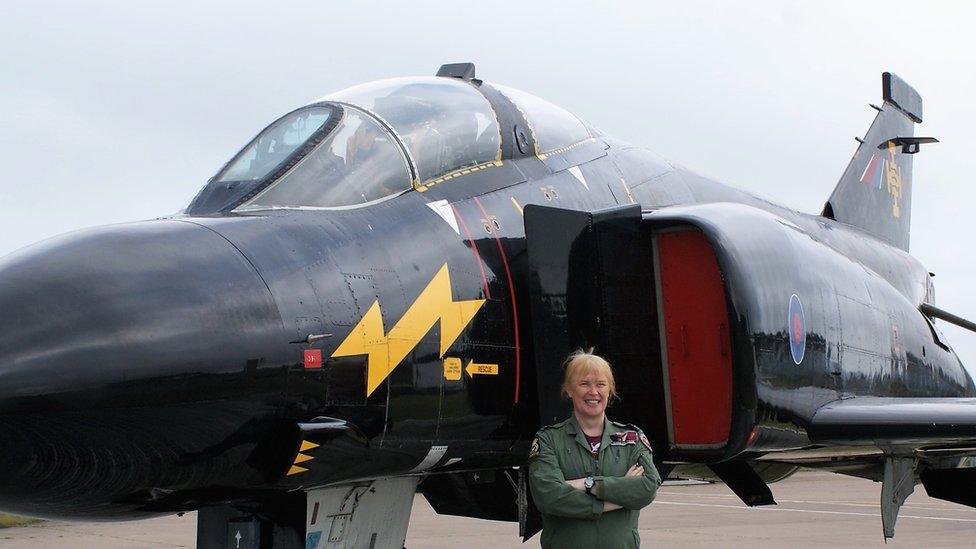
Caroline Paige, who became the first transgender officer to serve openly in the British Armed Forces, is backing calls for a national apology
Veterans who were sacked or forced out of the military for being gay have said they should receive an apology from the prime minister for their treatment.
A Hull woman was sacked by the RAF for being gay, and was told her potential was "marred only by her sexuality".
One Army veteran from West Yorkshire said his career was cut short in the 1970s due to his sexuality, and he was found guilty of gross indecency.
A government spokesperson said their treatment was "wholly unacceptable".
Until 2000, it was illegal to be gay in the British military - with more than 5,000 veterans thought to be affected.
An independent review into the impact of a historical ban on LGBT people serving in the Armed Forces has concluded, with the findings yet to be published by the government.

'It was going to be a career for life'
The veteran from Hull, who asked not to be identified, joined the Royal Air Force aged 19 in January 1986 as a painter and finisher of Nimrod aircraft at RAF Kinloss.
She said she knew the rules at the time she joined, but was not aware she was gay at that stage of her life.
"I didn't have any relationships with men or women at that time. I was sport mad," she said.
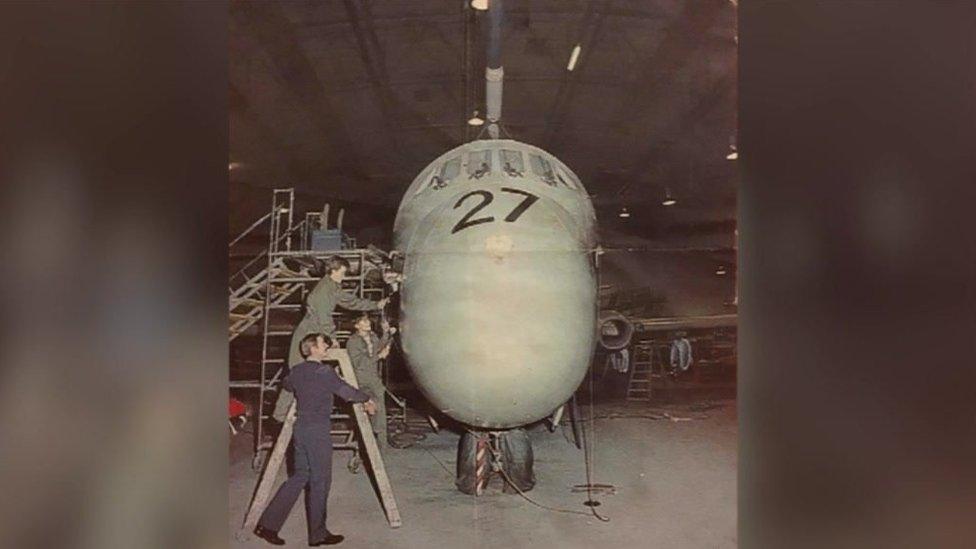
The young recruit worked as a painter and finisher of Nimrod aircraft at RAF Kinloss
The then-senior aircraft woman's first experience of "coming out" was in an interrogation room in 1991.
"The military police sat me down and I was basically questioned for two to three hours about my sexuality," she said.
"I went home and sat and thought, this is the end of my career - do I keep lying, do I live my life as a lie?"
She continued: "I was brought in the next day and the questioning all started again. I just broke down and said yes I am lesbian, gay. I confessed. I told the truth."
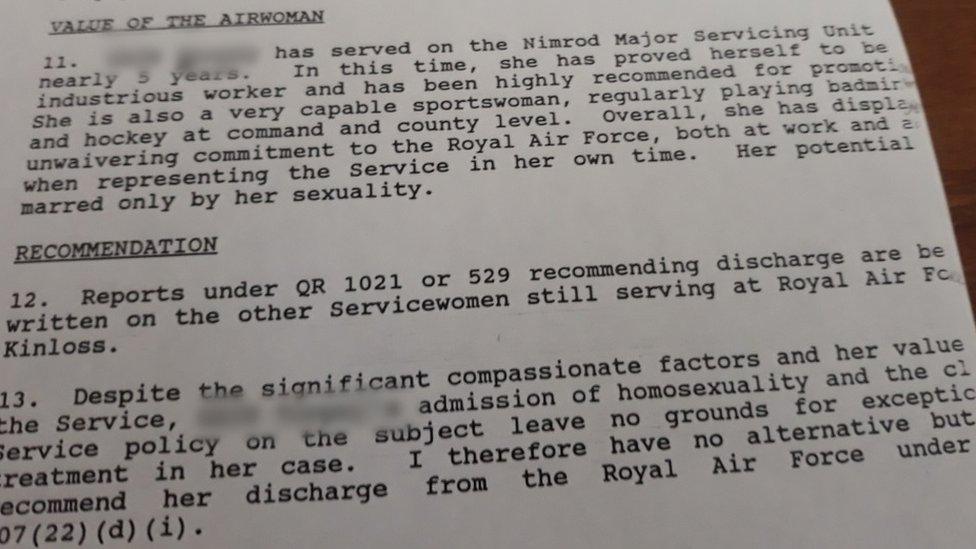
Her discharge certificate reads "her potential was marred only by her sexuality"
Despite recommendations for promotion and an "exemplary record", she was discharged from the RAF with a certificate reading her "potential was marred only by her sexuality".
"It was going to be a career for the rest of my life as I saw it at the time," she said.
"This happened to many, many people and it needs to be out there."

'I was kicked with steel toe cap boots'
Tony Sargeant, from Ossett in West Yorkshire, says he had his Army career cut short in the 1970s after he was "found guilty of gross indecency".
He was later cleared on appeal after he had served 112 days in military prison.
Speaking about when he joined, he said: "I hadn't been very good at school, I didn't have many qualifications then and I wanted a life that I could be proud of.
"I had no inclination as to my sexuality, but once I was in contact with other men I realised I had an attraction to them."
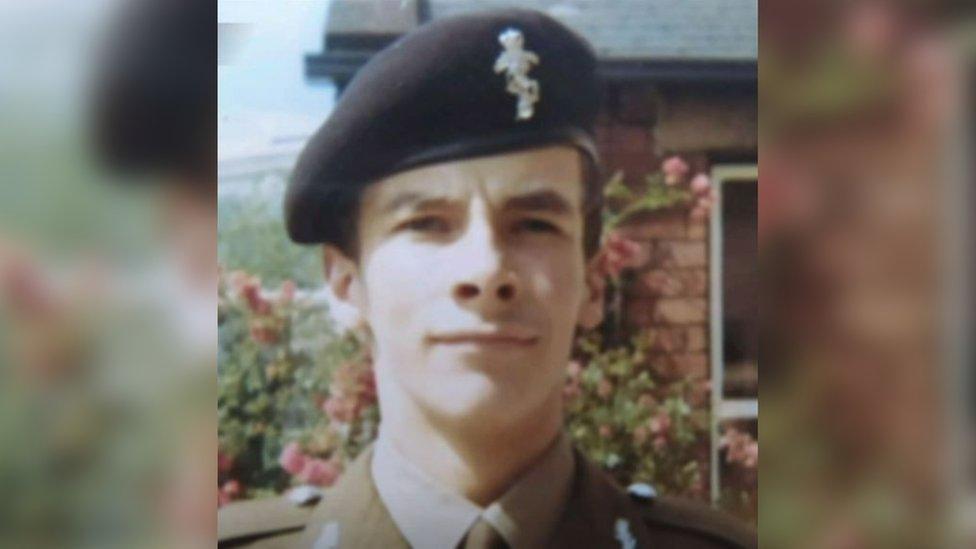
Tony Sargeant says he was arrested and placed in military prison
"After I was charged they transferred me to another camp, news of what I was charged with travelled with me and I was severely beaten up," he said.
"One of my attackers put steel toe cap boots on and did a lot of damage."
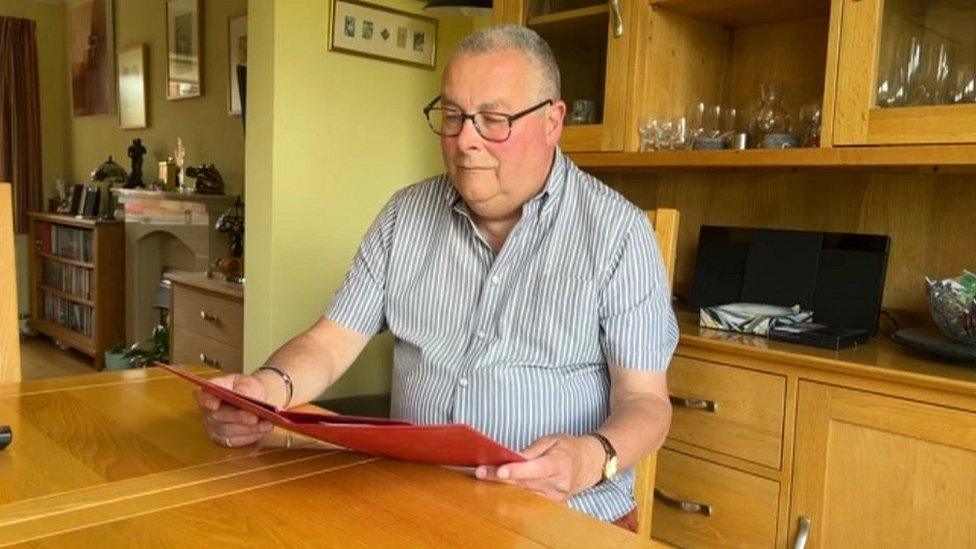
Mr Sargeant is calling for the inquiry findings to be published in full and for a government apology
Discussing the yet-to-be-published inquiry findings, he said: "The recommendation, I understand, that's in the report is that the prime minister apologises on behalf of the country.
"It's just someone saying sorry, but for me it's very important and it means a lot."

'People were dismissed because of who they were'
Caroline Paige, who lives in Lincoln, joined the RAF in 1980 aged 19 and went on to have a 35-year career in the Armed Forces.
The joint chief executive of military charity Fighting With Pride flew F4 Phantom fighters during the Cold War.
She served in the Gulf War and then switched from jets to helicopters - in Bosnia, Iraq and Afghanistan.
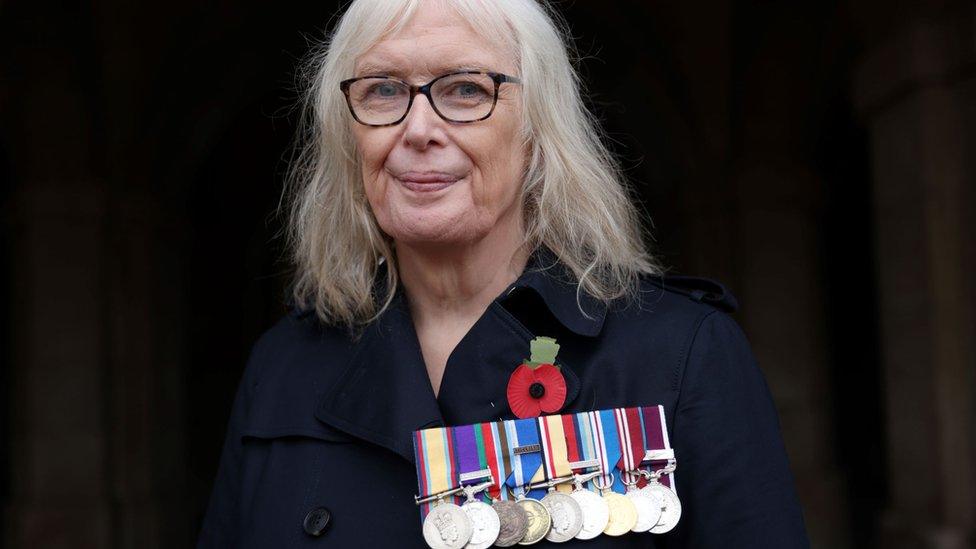
Caroline Paige says people were treated "disgracefully" while they fought for the rights and equalities of other nations
"The job I was doing was hugely high pressure, and on top of that you were having to hide your very identity in fear of being outed," she said.
"If you were outed you wouldn't just lose that fantastic job and all those friends around you, but I knew I'd lose family, my home and all my income - everything would come crashing down."
Ms Paige served 19 years as a male navigator pilot then another 16 years after transitioning, becoming the first transgender officer to serve openly in the British Armed Forces.
"I was determined to show people that it didn't make any difference whether I was transgender or not, I was just a person who was living their life and had jobs to do and the skills and experience to do it," she said.
Ms Paige, who now campaigns for the rights of veterans who were affected by the military ban, added: "We need a meaningful apology that has to come from the top, that's really important because that will impact everybody.
"We were dismissing tremendously capable people purely because of who they were and people who had stepped forward to serve their country."
A government spokesperson said: "We are proud of our LGBT veterans and grateful for their service in defence of our nation.
"The treatment of LGBT serving personnel pre-2000 was wholly unacceptable and does not reflect today's Armed Forces."
They added: "We can confirm that Lord Etherton has concluded his independent review and submitted his report to the government, We are carefully considering the findings and will respond in due course."

Follow BBC East Yorkshire and Lincolnshire on Facebook, external, Twitter, external, and Instagram, external. Send your story ideas to yorkslincs.news@bbc.co.uk, external.
Related topics
- Published9 June 2023
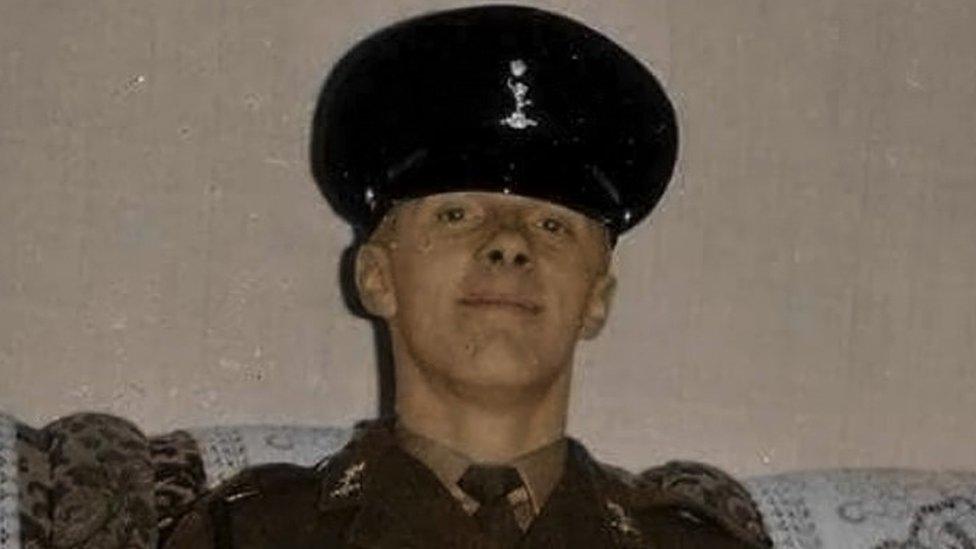
- Published2 November 2022
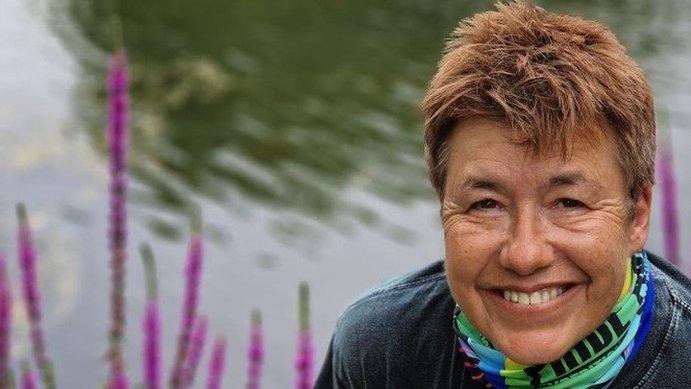
- Published22 June 2022
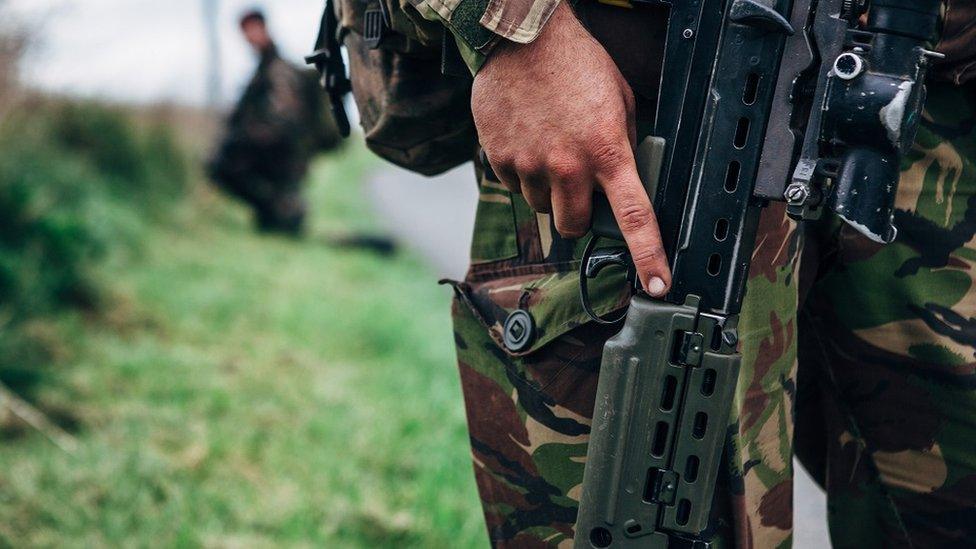
- Published17 November 2020
